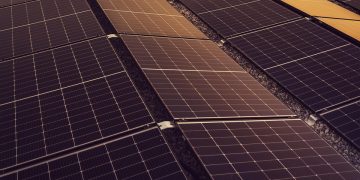The Power of Tomorrow: Harnessing the Potential of Renewable Energy
Renewable energy sources are becoming increasingly important as the world faces the challenges of climate change and the depletion of traditional fossil fuels. Harnessing the power of renewable energy is essential for creating a sustainable future for generations to come. In this article, we will explore the various types of renewable energy sources, their benefits, and how we can maximize their potential to create a cleaner and greener world.
Types of Renewable Energy Sources
There are several types of renewable energy sources that can be harnessed to generate electricity and power our homes, businesses, and communities. Some of the most common types include:
Solar Energy
Solar energy is the most abundant and widely available renewable energy source. It involves capturing the sun’s rays using solar panels and converting them into electricity. Solar energy is clean, sustainable, and can be used to power everything from small devices to entire cities.
Wind Energy
Wind energy is another popular renewable energy source that involves harnessing the power of the wind to generate electricity. Wind turbines are used to capture the kinetic energy of the wind and convert it into usable electricity. Wind energy is clean, abundant, and can be used in both residential and commercial settings.
Hydropower
Hydropower is a renewable energy source that harnesses the power of flowing water to generate electricity. Dams and turbines are used to capture the energy of rivers and streams and convert it into electricity. Hydropower is a reliable source of energy that can be used to generate electricity on a large scale.
Biomass Energy
Biomass energy involves using organic materials such as wood, crop waste, and animal dung to generate electricity. These materials are burned to create heat, which is then used to produce steam and generate electricity. Biomass energy is a renewable and sustainable source of energy that can help reduce our reliance on fossil fuels.
The Benefits of Renewable Energy
There are numerous benefits to harnessing the power of renewable energy sources. Some of the key benefits include:
Environmental Benefits
Renewable energy sources produce little to no greenhouse gas emissions, making them a cleaner and more sustainable alternative to fossil fuels. By reducing our reliance on fossil fuels, we can help mitigate the impact of climate change and protect the environment for future generations.
Economic Benefits
Renewable energy sources can create jobs, stimulate economic growth, and reduce our dependence on imported fossil fuels. Investing in renewable energy can help boost local economies and create a more sustainable energy future.
Energy Security
Renewable energy sources are abundant and widely available, making them a more secure and reliable source of energy than fossil fuels. By diversifying our energy sources and investing in renewable energy, we can reduce our vulnerability to supply disruptions and price fluctuations.
Maximizing the Potential of Renewable Energy
To maximize the potential of renewable energy sources, we must invest in research and development, improve infrastructure, and implement policies that support the transition to a cleaner and greener energy future. Some key strategies for maximizing the potential of renewable energy include:
Investing in Research and Development
Investing in research and development is essential for advancing renewable energy technologies and making them more efficient and cost-effective. By supporting research and development in areas such as solar, wind, and hydropower, we can unlock the full potential of these renewable energy sources.
Improving Infrastructure
Improving infrastructure is critical for integrating renewable energy sources into our existing energy systems. This includes upgrading transmission and distribution systems, building new storage facilities, and developing smart grid technologies that can better manage and distribute renewable energy resources.
Implementing Supportive Policies
Implementing supportive policies such as renewable energy mandates, tax incentives, and subsidies can help accelerate the transition to a cleaner and greener energy future. By creating a favorable regulatory environment for renewable energy, we can encourage investment and innovation in this critical sector.
Common Questions About Renewable Energy
As renewable energy sources become more prevalent, there are often questions and misconceptions about their viability and effectiveness. Here are some common questions about renewable energy:
Is renewable energy reliable?
Yes, renewable energy sources such as solar, wind, and hydropower are reliable sources of energy that can be used to power homes, businesses, and communities. By diversifying our energy sources and investing in infrastructure, we can ensure that renewable energy is a reliable and sustainable option for meeting our energy needs.
Is renewable energy expensive?
While the initial cost of installing renewable energy systems such as solar panels or wind turbines can be higher than traditional energy sources, the long-term cost savings and environmental benefits make renewable energy a cost-effective option. As technology advances and economies of scale are realized, the cost of renewable energy is expected to continue to decrease.
Can renewable energy replace fossil fuels?
Renewable energy sources have the potential to replace fossil fuels as the primary source of energy in the future. By investing in renewable energy technologies and transitioning to a cleaner and greener energy system, we can reduce our dependence on fossil fuels and create a more sustainable energy future.
Conclusion
Renewable energy sources have the power to transform our energy systems and create a cleaner and greener future for generations to come. By harnessing the potential of renewable energy, we can reduce our reliance on fossil fuels, mitigate the impact of climate change, and create a more sustainable energy future. Investing in research and development, improving infrastructure, and implementing supportive policies are key strategies for maximizing the potential of renewable energy and creating a more sustainable world.
As we look to the future, it is essential that we continue to prioritize renewable energy and work towards a more sustainable energy future. By harnessing the power of renewable energy, we can create a brighter tomorrow for ourselves and future generations.





